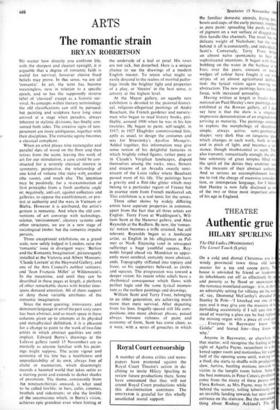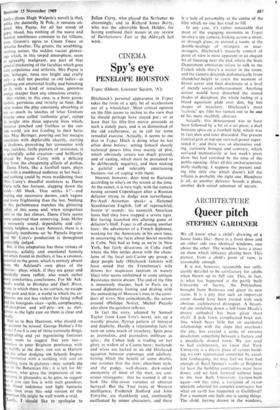THEATRE
Authentic grue
HILARY SPURLING
The Old Ladies (Westminster) The Lionel Touch (Lyric) On a cold and dismal Christmas eve in windy provincial town three old lad muster for a tea and cocoa party. house is unvisited by friend or trades its inhabitants cut off as effectively by and poverty as by flood or snowstorm the remotest moorland cottage : it is, in sho an admirable setting for villainy on the se of, say, Desmond McCarthy's dreaded Stanley St Pole-1 knocked out one of eyes and it may give you the measure of forbidding eccentricity if I tell you that stead of wearing a glass .eye he had replac the missing organ with a piece of oval go . . . Everyone in Bayswater knew "0 Goldie" and feared him—they knew why.'
Anyone in Bayswater, or elsewhere that matter, will recognise the feeling at fi sight of Agatha Payne, recumbent in a dar kened upper room and motionless for a g half of the opening scene until, waking w a thud, she starts to shuffle with prodigio slow, furtive, beetling motions towards victim in the lamplit room below. Some the best moments in Peter Cotes's product come from the nicety of these pauses w Flora Robson, as Mrs Payne, may be se behind the scenery, toiling laboriously an invisible landing towards her next Si entrance on the staircase. But the remark thing about Rodney Ackland's The Ladies (from Hugh Walpole's novel) is that, unlike the dastardly St Pole, it remains un- dated. Mrs Payne, for all her streak of gypsy blood, has nothing of the suave and fiendish nimbleness common to fat villains, from Grimm's ogres to Count Fosco or Abiatha Swelter. The grunts, the scrabbling, rootling noises, the sudden vacant glower- ings which, in this torpid atmosphere, seem so agreeably malignant, are part of that general thickening of the faculties which goes with corpulence and arthritis. Mrs Payne is dim, lethargic, none too bright and crafty only—a skill not peculiar to old ladies—at grubbing out emotional frailty and battening on it, with a kind of tenacious, gormless energy sharper than any conscious cruelty. Her victim, in this case, is a born goose, foolish, garrulous and twitchy to boot. But what makes the play constantly absorbing is not so much its touches of what Graham Greene once called 'authentic grue', rather its insight into three separate lives which, however pinched and fruitless to the out- side world, are not fe.otling to their hero- ines. May Beringer, pouring out her meagre inecdotes with deplorable alacrity, starting t shadows, provoking her tormentor with tiny, reckless, futile pockets of resistance, is splendidly solid creation—and brilliantly played by Joyce Carey with a delicacy free from the cheapening effects of pathos. Dame Flora, like a football team, plays hest with a maddened audience at her back : and nothing could be more maddening than Miss Carey's dreadful meekness as Dame Flora tells her fortune, slapping down the cards—`All black. That settles it!'—and roaring out successive dooms, each vaguer and more frightening than the last. Nothing n this performance matches the glittering jollity of this scene and, when sympathies shift in the last climax, Dame Flora seems more unnerved than unnerving. Joan Miller s eminently sound, dependable and ulti- mately helpless as Lucy Amorest, there is a singularly handsome set by Pamela Ingram and Mr Cotes's production is throughout admirably judged.
But, if this adaptation has those virtues of onomy, solidity and emotional honesty ot often found in thrillers, it has a cosiness, ential to the genre, which is entirely absent rom Mr Ackland's own plays of the hirties: plays which, if they are gayer and cidedly more raffish, also reach rather lore comfortless conclusions. For Mr Ack- and's world, in Birthday and Dark River, S one in which there is no curtain, no escape rom pain and fear, a world in which the ex- osions are not less violent for being stifled nd the bourgeois vices—spite, complacency, elf-deception and self-pity—are as dan- erous as the light cast on them is clear and eady.
And so to Rex Harrison, who should on 0 account be missed. George Hulme's The ionel Touch is one of those curiously dingy, appealing and yet ingratiating fantasies hich seem to suggest that you too- nniless in your Brighton penthouse with bailiffs at the door, one son at Harrow d the other dodging um Schools Inspec- , lumbered with a scolding wife and an Palling taste in pictures—may sample the Ys of the Bohemian life ; it is left for Mr arrison, who gives the impression of im- ovising in glissandos as he goes, to suggest at if you can live it with such grandeur, ch bland indolence and light fantastic ace, then even this odd version of the hemian life might be well worth a trial. LastlY, I should like to apologise to Julian Curry, who played the Scrivener so charmingly, and to Richard Jones Barry, who was the admirable Book Holder, for having confused their names in my review of Bartholomew Fair at the Aldwych last week.







































 Previous page
Previous page